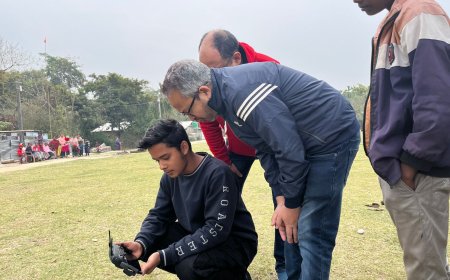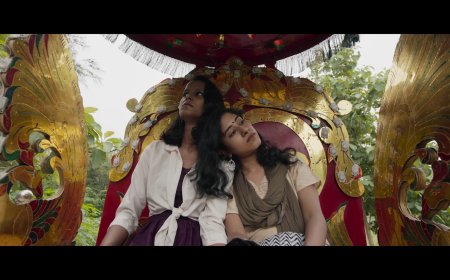SUNNY JOSEPH ON HIS DIRECTORIAL DEBUT - SALT OF THE EARTH
Kolkata based Indian film scholar, Shoma A. Chatterji interviews Sunny Joseph and remarks that Sunny Joseph is one of the most outstanding cinematographers in the country.
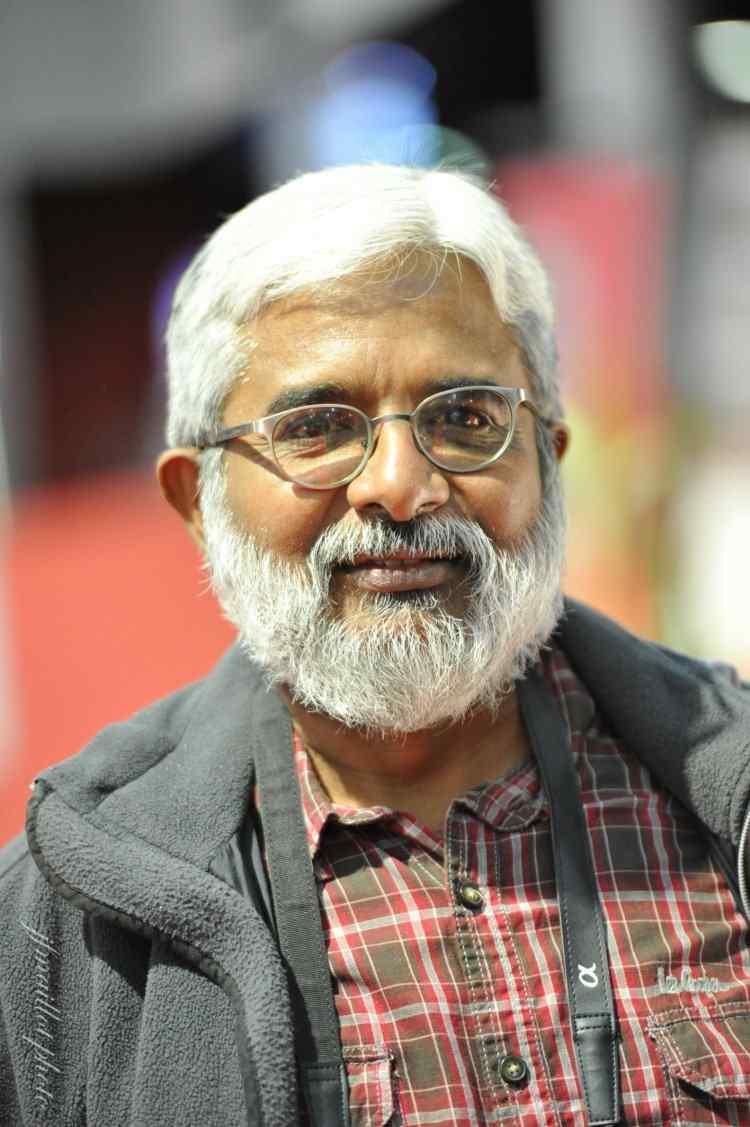
Sunny Joseph originally of Malayalam cinema, is one of the most outstanding cinematographers in the country. He is completely grounded and unassuming and never wears his fame and talent on his sleeve. Precisely because of his grounded nature, it took this gentleman 40 long years to make his directorial debut with the film Salt of the Earth in Malayalam which took away a large slice of his life’s savings. But he retains his completely modest self, smiling as much through the awards and accolades that have come his way as much as the obstacles he faced that extended his desire to direct to forty long years. He has bagged many awards among which one may mention the Kerala State Film Award for Best Cinematographer and the National Award for the best Experimental Film.
Joseph holds a Post Graduate Diploma in Cinematography from the Film and Television Institute of India (FTII), Pune. He is a former Chairman and General Secretary of Indian Society of Cinematographers (ISC). He began his career as cinematographer in 1987. Piravi the film which he photographed for Shaji N. Karun became a landmark in his career and in Indian Cinema. In 2002, Sunny assisted veteran cinematographer and Adoor Gopalakrishnan long-time collaborator, Mankada Ravi Varma, in his last work, Nizhalkuthu (2002) and shot many scenes and Sunny is credited alongside Mankada Ravi Varma. In 2002, Sunny assisted veteran cinematographer and Adoor Gopalakrishnan long-time collaborator, Mankada Ravi Varma, in his film Nizhalkuthu (2002) and eventually shot many scenes in the film for which Sunny is credited alongside Mankada Ravi Varma. He has done the cinematography for films in several Indian languages like Malayalam, Tamil, Bengali, Kannada, Manipuri, Hindi and English with eminent directors ranging from G, Aravindan, Shaji N Karun, Aribam Shyam Sharma, Malay Bhattacharya, Buddhadeb Dasgupta, K.G. George, Pamela Rooks to Chandrashekar. He has directed six short films and two television serials before embarking on his first independent, full-length feature film.
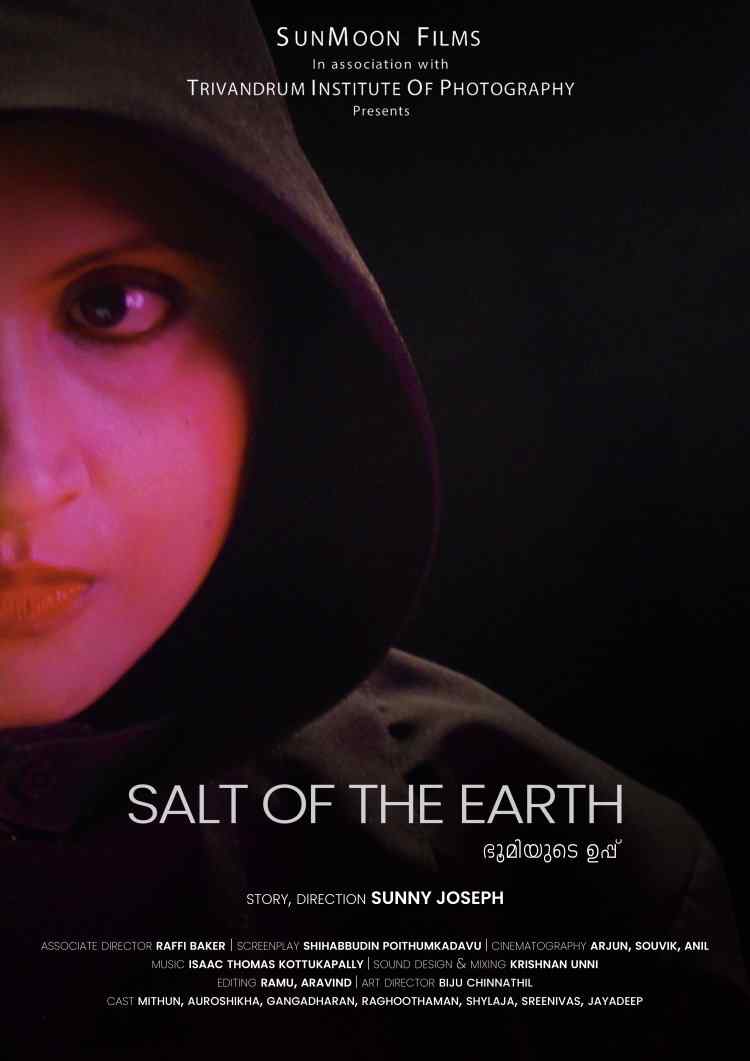
He opens up on his first directorial feature film when it was screened at the 28th Kolkata International Film Festival last year. Excerpts from an interview.
Why the intriguing title SALT OF THE EARTH? Please explain.
It is a quote from Jesus where he told the listeners "You are the Salt of the Earth". It indicates the responsibility of each one of us to others and compassion.The phrase derives from Jesus' Sermon on the Mount: “You are the salt of the earth.” (Matthew 5:13)
You have been a great success as a cinematographer. What made you switch to direction and why after so many years?
I joined FTII in 1979. My intention was to become a film-director. So I took up editing as my specialization. But in the final year the cinematography department offered me a seat (I was first in second year exams and topped in cinematography too.) So, I reluctantly became a cinematographer. Every year, I goy offers to do cinematography from master filmmakers. In 2002 I happened to show my Diploma Film Clown and the Dog to Zanussi. He liked the film and asked me "Why did you waste twenty years?" That is when I thought of directing a film. Yet it took another twenty years for me to do Salt of the Earth in 2022. Why so late? Every year was a hard struggle to run the family. I have invested my entire savings in this film. Getting a producer is another skill. I am poor at that.
You have not done the cinematography yourself for this film and have engaged three different cinematographers. Why not and why three?
While I was the Director of Revathy Kalamandir Film Academy, three of my students had to do cinematography and the students lacked a sense of direction. So I stepped in to do a film for them. Eventually, it became a full length feature film. My students Arjun, Souvik and Anil did the cinematography. The credit for visual quality goes to them. And Anil is my son too. Arjun has already done cinematography for two feature films. Souvik is doing serials and short films in Kolkata. Anil is assisting some of the Malayalam Cinematographers. The Editing was also done by two of my students Ramu and Aravind.
What motivated the idea for the story where two Catholic priests are on two sides of two extreme beliefs in God, one liberal and one extremely fundamentalist?
I call myself an agnostic. When I hear stories of intolerance and hatred happening across the country, I thought that I should talk about true spirituality. So the ideas of Narayana Guru (One Caste, One Religion, One God for Humanity) made me tell this story. Christianity is what I feel deeply so I placed the story within that context. The place of women in religion was also a subtext in the story. Why is God a Father and not a Mother? I believe that true spirituality is knowing the interconnectedness of one another. And knowing that we are all ONE .If there is a God, God can be exist only in human hearts. When we have compassion we make God present. An act of hatred can never be for God.
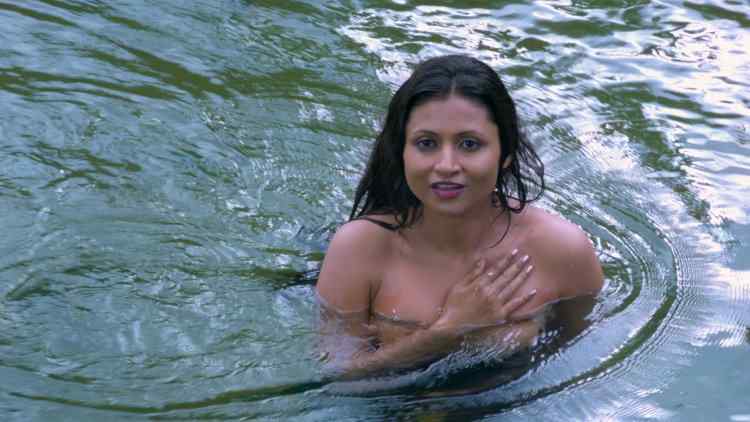
It is a very radical and bold step which might have gone against the theological scholars. What provoked you to write on this subject?
This comes from the blessings of my Gurus - G Aravindan, Subrata Mitra and Guru Nitya Chaitanya Yathi. I am 65 and not afraid of death anymore. My intention for telling this story is that love should spread all over the world. How can that be a negative idea? After seeing my film Zanussi said your film is against my film. It actually made me happy. In the sense that a great master like Zanussi understood my film correctly. But he still loves me. I love him too. He is like my elder brother. There may be some clergy who would see my film in a negative sense. But if Pope Francis sees my film, I am sure he will like my film. That is why I named the elderly Father in the film Fr. Francis.
You have declared that you are an agnostic but you believe in prayers. How do you reconcile to this considering that you once aspired to join the Church?
Yes, when I was a child of six, I wanted to become a priest. A mass in the church was a big drama/performance. The priest was a supreme performer. The colours and sounds of the Altar were mgical. I equally wanted to become a magician. As a filmmaker I am both. (Laughs) I like to trust the Mother Goddess. I invoke her name everyday. I call out to "Amme Mahamaye”. Prayer is wishing for good to happen to all. And at least in two instances my prayers were answered. I pray to the one creative force without name and shape -the Mother - Maha Maya.
Which are the locations you shot in and how long did it take from conception to the CBFC?
This film was made for my students and the RKFA building was the main location was the monastery and Ponmudi Hills near Trivandrum for the outdoors. The Guest House was the property of filmmaker Shyamaprasad who gave it to me for filming free of cost. We finished filming 7-8 years ago. The music was composed in 2019. The final post-production happened in 2022 and shooting was wrapped up within 21 days and the work kept dragging for want of funds.
You have mostly chosen new faces or little known faces for the cast. How did you prep them for the film? Script reading sessions? Workshops? Rehearsals? A combination of all of these?
As a no-budget film, I could get the actors only during filming days. They are all trained actors. So my work was not so hard. Mithun is a graduate of the Drama School at Thrissur. Auroshikha is a graduate from FTII. Both Raghoothaman and Sreenivas are veteran theatre actors with film experience. Jayadeep and other novices were acting students from my Academy. I did rehearse with all the actors. And for Mithun I made him watch Tarkovsky's film Sacrifice in my home.
As director, how much liberty do you give to your actors, also specially the editors and the cinematographers, to improvise or use their own innovative ideas? Please explain.
I trust that the transfer of emotions between the audience and screen is best achieved through actors. I love them like my children. But like any director, I wish that they portray the characters above their own persona. To achieve this, I used all tricks. As for editors, I am very strict that they follow my instructions but give them the freedom to express their ideas. I may take it. For cinematographers I give full freedom.
What are your takeaways from the film - good and bad? Elucidate please.
Bad things first. You need the right budget for any film to succeed. Never be your own producer. Good things. The JOY I experienced making the film is immeasurable. I am richer for that. After viewing the film with others many times, I feel I should have used a slower pace.
The music is mesmerising. What brief did you give to your music director?
This is the last film where Isaac Thomas Kottukapally did the music. I had maximum discussions with Isaac as my collaborator among all my artistic collaborators, on music. Many corrections and revisions were done. I had a detailed plan for music. After the first recordings, he came to my home in Pallickathodu and we made another revision. He was so patient with me. And he was the one who wanted to see the film completed. I am sure his blessings are also with me.
You have worked as cinematographer for the most outstanding filmmakers in the country. Can you express in a line or two, your takeaways from each of them such as Adoor, Aravindan, Buddhadev Dasgupta, Aribam Shyam Sharma, Shaji Karun, T.V. Chandran?
Adoor Gopalakrishnan - The precision of script and control of actors. Master filmmaker of minimalism.
Aravindan - The freedom of true artists, unique language of cinema and compassion. A true master.
Buddhadeb Dasgupta - Challenged my creative ability to improve, a master of time and space. Complete Filmmaker.
Aribam Shyam Sharma - Pure Cinema. Pure soul. The spiritual essence of India.
Shaji N Karun - Eminent cinematographer and master director from who I learned a lot about cinema.
TV Chandran - My crazy friend who loves cinema. I was fortunate to work with him, another master filmmaker.
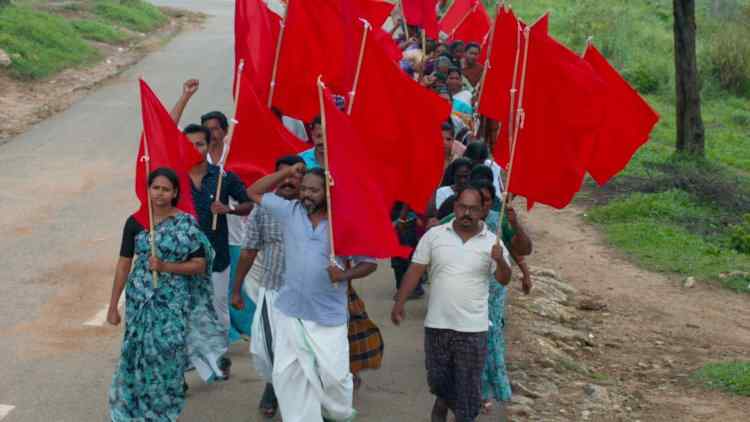
What are the criteria for you to accept a cinematographic assignment?
I really had no choice. I hardly rejected any film.
What differences do you find between cinematography and direction if any?
Direction means taking full responsibility for my cinema. Cinematography is more heartache. It is a zero error job.
Which cinematographers across the International map would you name as icons in cinematography and why?
Subrata Mitra, VK Murthy, Sven Nykvist, Roger Deakins, Vadim Yusov, Vittorio Storraro. I need to write six chapters to explain.
Do you think that training at institutes like FTII places one at a greater advantage than not training at all such as Goutam Ghose has done? Give reasons for your response.
Yes, any kind of training definitely helps. Learning at a film school is good because it gives one a historical perspective of cinema. And you get trained in the latest technology. Watching two films a day for three years itself, enlightening. Viva Cinema.
A comment on the state of cinema within Kerala. Has it improved over the years? That is, has it changed for the better or for worse? Explain.
Yes, cinema in Kerala is also improving. I am hopeful.
Looking back, how do you look at your professional life in general?
I was lucky to have received the love of great masters of Indian Cinema. I would like to do more films as a director. I am happy that I am a cinematographer, editor, and director.
Your final word on cinema?
CINEMA IS LOVE 24 TIMES PER SECOND.
***
What's Your Reaction?





















































